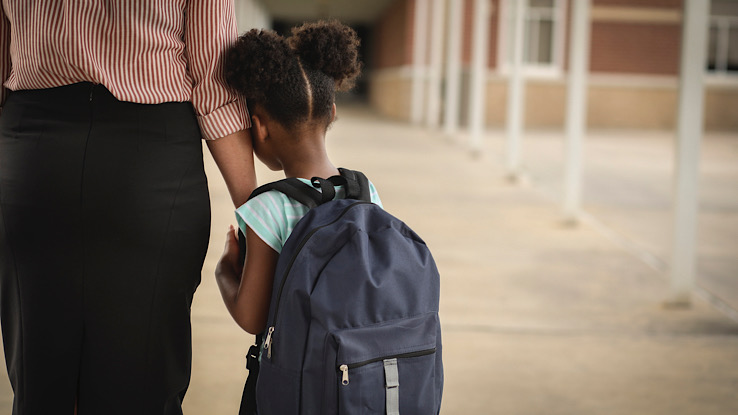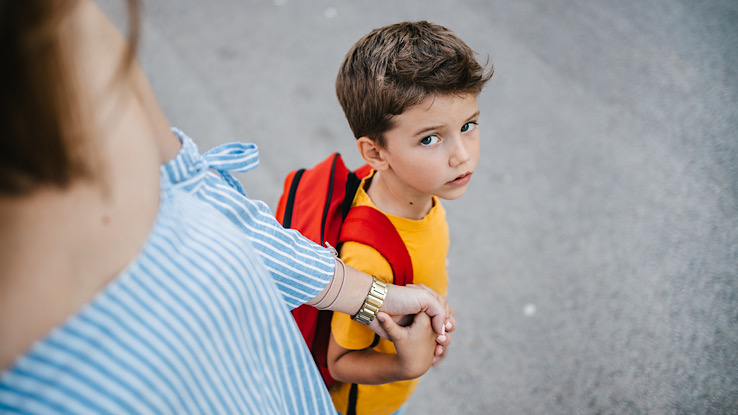
Separation anxiety in children going to school is often a part of childhood development for many kids. However, it can be very distressing to both the child and the parents or caregivers. Although it can be a fascinating time when a young child first enters school, it can also be highly stressful and frightening for some children. A child who is extremely nervous about attending school for the first time may experience intense fear, leading to panic and resistance.
What Is Separation Anxiety?
Separation anxiety is a common condition that occurs in many children during childhood. This condition typically first appears around a child’s first birthday. At this age, it is not uncommon for children to become visibly distraught when their parents or caregivers attempt to leave them in the care of another person. Children often fight the parent’s or caregiver’s attempts to escape, resulting in crying, yelling, and even temper tantrums. This stage usually resolves within a few months; however, it can often return when the child first attends school.
How Does It Occur?
For many children entering the school-age years, it is the first time they will be away from home for an extended period daily. Being forced to spend their day in a new environment outside of the comfort of their home can often lead to feelings of fear, anxiousness, nervousness, and panic. If these feelings become intense enough, they can develop avoidance behaviors such as excessive clinginess, crying, yelling, and even temper tantrums.
Even children accustomed to spending time outside the home daily, such as those who attended daycare, may experience separation anxiety when they start school. Changes in the environment, a new routine, new faces, and an unfamiliar setting can all contribute to separation anxiety in school-aged children.
What Symptoms Might Your Child Display?
For parents or caregivers to help their children work through separation anxiety, they must first be able to identify the condition. Once you recognize the symptoms of separation anxiety, you can start to develop strategies to counteract the situation and help your child work through it. Common physical symptoms of separation anxiety in school-aged children include:
- Nausea
- Vomiting
- Shortness of breath
- Panic attacks
- Sweaty palms
- Headache
Emotional symptoms of separation anxiety are often displayed as well. Usually, a child will complain of an illness close to when they have to leave to go to school. Complaints may be vague, such as a sore throat, headache, upset stomach, or not “feeling well.” Children may display other emotional symptoms of separation anxiety, including:
- Nightmares
- Difficulty falling asleep
- Displaying clingy behavior
- Fear of sleeping alone at night
- Fear of the dark
- Extreme worrying about being lost
- Fear of being alone
- Panic of leaving their parent’s or caregiver’s side any time they are outside of the home
- The constant belief that something terrible is going to happen to them
Other Symptoms of Separation Anxiety
Many times, the symptoms of separation anxiety can be mistaken for other personality traits, such as rebellion, defiance, stubbornness, or anger. If your child has separation anxiety, it is essential to understand that the underlying cause for these symptoms is anxiety, fear, and panic, and not the negative behavior traits listed above.
These symptoms are relatively common in school-aged children suffering from separation anxiety. For most children, separation anxiety is a temporary condition that will go away once the child becomes more comfortable with the new school environment. Some children continue to experience separation anxiety for extended periods. When this happens, if the child cannot advanc past this developmental stage, parents may need to seek professional help.
If a child with persistent separation anxiety does not receive proper treatment, there are potential long-term effects, such as developing panic and anxiety disorders as an adult. Additionally, academic and social development problems can develop if the child’s condition interferes with his schooling and social life.
Are There Specific Triggers?

Getting ready to leave for school often triggers anxiety symptoms. The panic from separation anxiety generally will set in as the child prepares to leave for school. The pressure is associated with the initial drop-off, which brings about the realization that the child will not be able to spend the day at home. Once that drop-off period has come and gone, the child will generally adapt very quickly in the classroom and remain calm throughout the rest of the school day.
Additional factors that can trigger separation anxiety include:
- Stress
- Illness
- Birth of a new sibling
- Living in a new home
- Attending a new school
- Tension at home
What You Can Do To Help
Here are some strategies parents or caregivers can use to ease their child’s anxiety and make the transition to school easier. These strategies include:
- Do not leave for school if your child is hungry, tired, or restless. These factors can all intensify anxiety. Make sure your child receives an adequate amount of sleep and eats a healthy breakfast.
- Make a few practice runs to the school a few weeks before the school year begins. Drive by the school often and explain to your child where he will be going when school starts. For these practice runs, wake your child up, have him get dressed, and follow the exact school day routine you would follow on an actual school day.
- Visit any open house or meet the teacher nights that the school offers. Let your child see their desk, explore the classroom and spend some time getting acquainted with new classmates and teachers.
- Remain calm and be consistent with your drop-off routine. Say goodbye in a loving manner. Remain calm and try not to become too emotional. Reassure your child that he will be fine and that you will be there to get him when the school day is over.
When Professional Help May Be Necessary
Most children with separation anxiety will progress out of the phase without professional assistance. Suppose separation anxiety persists for an extended period and the child does not seem to be making a healthy transition into the classroom. In that case, you should seek help from a doctor or qualified mental health professional. If your child refuses to go to school, especially if the child is over the age of 12, there may be other issues that the parents are unaware of. In such cases, professional help or more intensive treatment may be necessary.
Medical content reviewed by Carolin Schneider, MD
Resource Links:
- “Separation Anxiety” vis StatPearls
- “Returning to School: Separation Problems and Anxiety in the Age of Pandemics” via Behavior Analysis in Practice
- “Separation Anxiety Disorder in School-Age Children: What Health Care Providers Should Know” via Journal of Pediatric Health Care
- “Anxiety disorders in children and adolescents: Need for early detection” via Journal of Postgraduate Medicine





